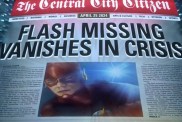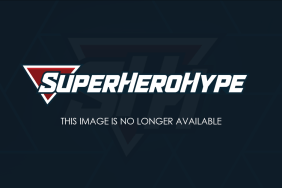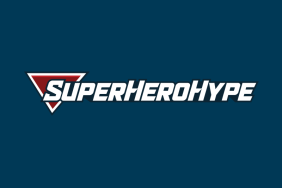Unable to continue containing its power inside the explosive panels of the comic book page, Severin Films is releasing Future Shock! The Story of 2000AD on Blu-ray and DVD May 30. We had the chance to talk to arguably the documentary’s most important subject, 2000AD’s creator, writer and longtime editor Pat Mills, who had a hand in creating such iconic British comics characters as Judge Dredd, ABC Warriors, Nemesis the Warlock, Sláine and Marvel’s Marshal Law. Check out the exclusive interview below, which also features excerpts from Mills’ upcoming e-book about Judge Dredd and 2000AD!
Great Britain, end of the ‘70s: Thatcher is in power, the Yorkshire Ripper is on the loose, punk rock is on the rise and shite comics are widespread. But with the birth of indie upstart 2000AD, fans were introduced to visionary talent like Alan Moore, Neil Gaiman and Mark Millar, and legendary characters that included Rogue Trooper, Halo Jones and Judge Dredd. Yet what happened next to this nihilistic, ultra-violent universe may be the biggest shocker of all. Future Shock! The Story of 2000AD features interviews with editors, writers, artists and fans including Gaiman, Pat Mills, Alan Grant, John Wagner, Grant Morrison, Dave Gibbons, Geoff Barrow, Bryan Talbot, Emma Beeby, Kevin O’Neill, Brian Bolland, Carlos Ezquerra, Gary Erskine, Andy Diggle, Scott Ian, Geoff Barrow, Alex Garland, Karen Berger and more.
Click here to pre-order Future Shock! The Story of 2000AD on Blu-ray!
SuperHeroHype: What appealed to you about telling the story of 2000AD when you were approached to appear in the documentary?
Pat Mills: Gosh! Everything. I’m just completing writing “Be Pure! Be Vigilant! Behave! 2000AD and Judge Dredd: The Secret History,” which is released end of May as an e-book. So this gives you an idea of just how passionately I feel about the comic. My book and the documentary cover related but separate grounds.
SHH: During the heady early days, were you just trying to get away with this fresh style of comics as long as you could or was there a part of you that felt like it could really last the way it ultimately did?
Mills: I always felt it would last. Although there were several attempts to destroy it, narrated in the doc. Bear in mind, I’d previously created Battle (with John Wagner) and Action, so I knew how to produce a commercial comic.
SHH: What was the high point for you personally during your tenure at 2000AD?
Mills: Writing Judge Dredd the Cursed Earth.
SHH: Hypothetically, if the comic had carried the financial clout to retain a lot of the creators who jumped ship (Brian Bolland, Alan Moore, Grant Morrison, Neil Gaiman, etc), how do you think that would that have ultimately changed both British comics and comics at large?
Mills: I should correct you where Neil is concerned. Here’s an excerpt from my forthcoming book:
It takes time for this (new) style to grow on the readers. For them to get used to a new approach. It can apply to us all and it certainly applied to two of 2000AD’s most well-known contributors, Alan Moore and Grant Morrison, both of whose preliminary scripts had been put on ice by an uncertain editorial until assistant editor Alan Grant insisted they be used.
Neil Gaiman, too, was also blocked as a writer. You might imagine from his interview on the 2000AD documentary that he was a regular contributor to the Galaxy’s Greatest Comic, but, as far as I’m aware, only one of his scripts, a good, one-off Future Shock, drawn by the late John Hicklenton, was ever published in 2000AD. It was also John Hicklenton’s debut to 2000AD. I have no idea why such a talented writer as Neil Gaiman was blocked, but he certainly was.
Coming back to your question, I think all those creators probably preferred American comics to 2000AD. It’s possible to confirm this from their work in other directions. I think Alan started work on Warrior, an American-orientated Brit comic before 2000AD. As Grant admits himself on the documentary, his later editorially-endorsed and connected revision work on 2000AD during the ’90s actually added to its troubles, so naturally I’m delighted he left. He seems to regret what feels like acts of creative sabotage; as he says, “We were the bad boys.” I don’t see unwelcome changes to the comic as being “bad boys,” just a rather uncool thing to do. But he seems to have reveled in what comes over in the documentary as an attack on the creatives and thus the readers on 2000AD. The comic was already in trouble at that time without a further “bad boy” kick in the balls from him. That might just have finished us off, which wouldn’t have been very “cool,” unless you have another definition of the word. However, he now seems to recognize the damage he caused, so that’s a good thing.
Brian, I guess there was a small chance he might have stayed. It would have improved circulation – e.g. covers. When we had Bisley on Horned God it led to an upsurge in circulation, so the same could have happened with Brian. Higher circulation could have led to more comics, but – as the documentary makes pretty clear – the staff in the ’90s didn’t know what they were doing, so they would have screwed things up, irrespective of talent. It took Rebellion to rescue 2000AD.

SHH: What do you consider to be the difference between storytelling that is simply transgressive for the sake of transgression and storytelling that is genuinely subversive?
Mills: There’s a big difference. The former is a pose. It’s trying to be cool. The second comes from the heart. Certainly my stories come from the heart. Most of the key stories of the new wave – Battle, Action and 2000AD – had elements of subversion. In Action, Hook Jaw fights an ecological battle against American oil companies. In Battle, “Charley’s War” becomes the only anti-war story ever to succeed in mainstream comics. Alan Moore’s “Halo Jone” lives in a science fiction version of a nightmare council (public housing) estate which she successfully escapes. There’s “Nemesis” where the human empire, led by Torquemada, is the threat to aliens, not the other way round. “Strontium Dog”‘s mutants as a metaphor for racism. Or Skin in 2000AD’s “Crisis” about a skinhead affected by thalidomide.
SHH: Likewise, what’s a case of a comic you’ve worked on having its satire largely misinterpreted by the readers? Is that more of an American thing of unwittingly admiring fascist characters, etc?
Mills: It was a potential danger on “Dredd,” but never really happened. However, when a comic book character was too real, like Finn, a witch and political actitivist who featured in “Crisis” and 2000AD it scared some readers AND the 2000AD editors. Written by myself and a real witch, Tony Skinner, it was more popular than “Slaine,” but editorial still shut it down. Readers misinterpreted that it was only a story.
Here’s a quote from my book:
The extraordinary discrimination against witches would affect the story Finn. My experiment in using real people in Third World War was about to rebound on me – because Finn had far too much for 2000AD’s taste.
The Finn occult details in the story were so detailed, it was clear they weren’t from our imagination. One reader was sufficiently impressed to contact me and ask if he could join Tony’s community. He was accepted and is a member to this day. Other politically correct readers, however, seemed to expect Finn to adhere to the high moral standards of a traditional comic goody-good like the original Dan Dare or Superman, and objected to some of Finn’s magical practises and sacrifices. Some details we naturally hyped up for dramatic purposes. Just as I assume Grant Morrison does in his works of magical fiction. It’s normal. But there must have been a resonance about this story that particularly bothered some readers. Finn certainly does look evil in his techno-pagan mask (originally designed by Angela Kincaid).
That said, would these same people complain about Breaking Bad or Nighty Night (British black comedy series) where there are equally questionable but fascinating protagonists? Anyway, they complained about Finn and I sensed from the way negative letters were being printed that they were receiving editorial encouragement.

SHH: If a proper filmmaking team came along with the appropriate respect for the material, what 2000AD character would make the best translation to film or TV that hasn’t been done yet?
Mills: I had to think about this for the book, so I think my excerpt below covers it. Again, do use anything relevant. They are realistic appraisals of what is possible, so you may have the expert knowledge to judge if I’m right.
(After the Dredd tv series) other 2000AD characters could follow and be turned into films or tv series. My guess would be Strontium Dog and Rogue Trooper because they seem closest to Rebellion’s heart and are possibly the easiest. If it’s TV, perhaps Flesh. I’m not sure the TV series Terra Nova, also about time travel, makes little difference one way or the other.
ABC Warriors – an all-robot cast – is maybe a harder sell, despite Transformers. Then there’s Slaine: the success of Game of Thrones is in its favour and it has come close twice recently to being optioned. Nemesis is possibly too dark for a regular audience, but has cult and cartoon potential. Outside of 2000AD, a “cousin” of all these characters, Marshal Law, has not been optioned at the time of writing, but we regularly get movie interest in the superhero hunter.
Another “cousin,” Accident Man (from Toxic! comic) by Tony Skinner and myself, is finally being made into a film with actor Scott Adkins starring.
SHH: There’s a big discussion about several Hollywood properties that clearly aped or stole the 2000AD vibe. What was the most egregious?
Mills: Was “Terra Nova” influenced by “Flesh”? It could have been. “RoboCop” is the most notorious. “Marshal Law” might have influenced “Deadpool,” according to some fans. I haven’t seen it, so don’t know. It sounds like there might be others I don’t know about!

SHH: Do you think the current wave of conservatism across the globe, particularly in America, is going to inspire the same anarchic spirit in creators as when you and your artists were railing against Thatcher, or will it roll over artists and writers in the industry and pervert the product being put out?
Mills: Well observed. Thus far it seems the latter, which is sad.
Again, I’ve addressed this in my book. 2000AD’s spin-off Crisis contained “Third World War” about the politics of food. This later led to the story “Finn” above. Here we go:
In the dumbed-down times we currently live in, where so many escape into science fiction, Third World War must seem most bizarre and unlikely. Who cares about the politics of food today? Well, people actually did at the time. And it wasn’t just about charity, which can have a questionable side to it. Many readers who had grown up with 2000AD were becoming politically orientated and active. It was a time of strife and change and young people wanted to understand why so much of the world was starving. Why weren’t these charities’ requests for money making a difference? There were endless books on the subject on sale in popular bookshops. They rightly pointed out the IMF and the trans-nationals were responsible. Susan George’s seminal works A Fate Worse Than Debt and How The Other Half Dies: the Real Reasons for World Hunger were popular and very readable best-sellers.
So Steve and Igor were absolutely right in considering world hunger as a basis for a story. As I’d written the long running anti-war saga Charley’s War, it was clearly perfect for me.
And readers were pointing out to me the obvious flaw in science fiction or satire: that it can run away from reality or mask its message so effectively that no-one knows or cares.
I recall, in particular, two students who had visited Israel and were appalled by the how Palestinians were treated as an underclass. The gist of what they said to me, was: “Why are all you writers hiding behind science fiction to get across your message? Using robots as a metaphor for slaves? Featuring monsters like Torquemada when you really mean Norman Tebbit and Thatcher? Why don’t you stop pissing about and start telling it like it is?”
So I did. The series worked. It was joined later by the very popular Troubled Souls by Garth Ennis and John McCrea and the daring masterpiece Skin about a skinhead who was affected by the drug thalidomide. Passionately written by Peter Milligan and beautifully illustrated by Brendan McCarthy, like other Crisis stories it drew on real life. Goodbye, superheroes.
Crisis led to me writing about other ordinary heroes: anti-vivisectionists, black freedom fighters, prison survivors, ecotage, British soldiers who deserted and teenagers experiencing the Troubles in Northern Ireland. Often, I would write in co-authorship with these ordinary heroes. There were so many more I would have loved to have produced. Eventually, Amnesty commissioned me to write an Amnesty issue of Crisis.

SHH: I’m a big fan of “Requiem Vampire Knight,” especially the way it pushes boundaries of outrageous storytelling and baroque design the way nothing besides a comic book can do. Once Volume 13 is out, where do you think it will stand in your body of work?
Mills: Good question. The English language digital edition is selling well on Comixology so that suggests it could break the mould and do well in the Anglo-american market. That’s remarkable because – as you doubtless know – it’s hard for French comics to be accepted by a large audience in the States. But the artist does love superheroes so that helps! As a footnote, and pertaining to your questions, here in the UK it’s now also hard to pursue subversive themes, even in 2000AD, except in limited areas. Consequently I’m turning to prose. My text novel (with Kevin O’Neill) “Serial Killer” is about a comic book editor and serial writer who is also a serial killer. It’s a black comedy about British comics. It’s doing well since its launch on Amazon in February with over 50 five star reviews.
SHH: Do you and Kevin have any intent to do more with “Marshal Law” in the future?
Mills: We were commissioned to write a Law/Batman cross-over by DC. They suggested the idea to us. Then, two years later, they changed their minds and pulled the plug.







